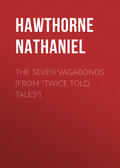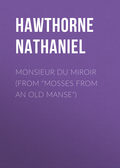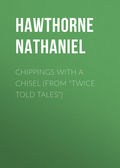
Натаниель Готорн
A Book of Autographs
The collection is enriched by a letter dated "Cambridge, August 26, 1775" from Washington himself. He wrote it in that house, – now so venerable with his memory, – in that very room, where his bust now stands upon a poet's table; from this sheet of paper passed the hand that held the leading-staff! Nothing can be more perfectly in keeping with all other manifestations of Washington than the whole visible aspect and embodiment of this letter. The manuscript is as clear as daylight; the punctuation exact, to a comma. There is a calm accuracy throughout, which seems the production of a species of intelligence that cannot err, and which, if we may so speak, would affect us with a more human warmth, if we could conceive it capable of some slight human error. The chirography is characterized by a plain and easy grace, which, in the signature, is somewhat elaborated, and becomes a type of the personal manner of a gentleman of the old school, but without detriment to the truth and clearness that distinguish the rest of the manuscript. The lines are as straight and equidistant as if ruled; and from beginning to end, there is no physical symptom – as how should there be? – of a varying mood, of jets of emotion, or any of those fluctuating feelings that pass from the hearts into the fingers of common men. The paper itself (like most of those Revolutionary letters, which are written on fabrics fit to endure the burden of ponderous and earnest thought) is stout, and of excellent quality, and bears the water-mark of Britannia, surmounted by the Crown. The subject of the letter is a statement of reasons for not taking possession of Point Alderton; a position commanding the entrance of Boston Harbor. After explaining the difficulties of the case, arising from his want of men and munitions for the adequate defence of the lines which he already occupies, Washington proceeds: "To you, sir, who are a well-wisher to the cause, and can reason upon the effects of such conduct, I may open myself with freedom, because no improper disclosures will be made of our situation. But I cannot expose my weakness to the enemy (though I believe they are pretty well informed of everything that passes), by telling this and that man, who are daily pointing out this, and that, and t' other place, of all the motives that govern my actions; notwithstanding I know what will be the consequence of not doing it, – namely, that I shall be accused of inattention to the public service, and perhaps of want of spirit to prosecute it. But this shall have no effect upon my conduct. I will steadily (as far as my judgment will assist me) pursue such measures as I think conducive to the interest of the cause, and rest satisfied under any obloquy that shall be thrown, conscious of having discharged my duty to the best of my abilities."
The above passage, like every other passage that could be quoted from his pen, is characteristic of Washington, and entirely in keeping with the calm elevation of his soul. Yet how imperfect a glimpse do we obtain of him, through the medium of this, or any of his letters! We imagine him writing calmly, with a hand that never falters; his majestic face neither darkens nor gleams with any momentary ebullition of feeling, or irregularity of thought; and thus flows forth an expression precisely to the extent of his purpose, no more, no less. Thus much we may conceive. But still we have not grasped the man; we have caught no glimpse of his interior; we have not detected his personality. It is the same with all the recorded traits of his daily life. The collection of them, by different observers, seems sufficiently abundant, and strictly harmonizes with itself, yet never brings us into intimate relationship with the hero, nor makes us feel the warmth and the human throb of his heart. What can be the reason? Is it, that his great nature was adapted to stand in relation to his country, as man stands towards man, but could not individualize itself in brotherhood to an individual?
There are two from Franklin, the earliest dated, "London, August 8, 1767," and addressed to "Mrs. Franklin, at Philadelphia." He was then in England, as agent for the colonies in their resistance to the oppressive policy of Mr. Grenville's administration. The letter, however, makes no reference to political or other business. It contains only ten or twelve lines, beginning, "My dear child," and conveying an impression of long and venerable matrimony which has lost all its romance, but retained a familiar and quiet tenderness. He speaks of making a little excursion into the country for his health; mentions a larger letter, despatched by another vessel; alludes with homely affability to "Mrs. Stevenson," "Sally," and "our dear Polly"; desires to be remembered to "all inquiring friends"; and signs himself, "Your ever loving husband." In this conjugal epistle, brief and unimportant as it is, there are the elements that summon up the past, and enable us to create anew the man, his connections and circumstances. We can see the sage in his London lodgings, – with his wig cast aside, and replaced by a velvet cap, – penning this very letter; and then can step across the Atlantic, and behold its reception by the elderly, but still comely Madam Franklin, who breaks the seal and begins to read, first remembering to put on her spectacles. The seal, by the way, is a pompous one of armorial bearings, rather symbolical of the dignity of the Colonial Agent, and Postmaster General of America, than of the humble origin of the Newburyport printer. The writing is in the free, quick style of a man with great practice of the pen, and is particularly agreeable to the reader.
Another letter from the same famous hand is addressed to General Palmer, and dated, "Passy, October 27, 1779." By an indorsement on the outside it appears to have been transmitted to the United States through the medium of Lafayette. Franklin was now the ambassador of his country at the Court of Versailles, enjoying an immense celebrity, caressed by the French ladies, and idolized alike by the fashionable and the learned, who saw something sublime and philosophic even in his blue yarn stockings. Still, as before, he writes with the homeliness and simplicity that cause a human face to look forth from the old, yellow sheet of paper, and in words that make our ears re-echo, as with the sound of his long-extinct utterance. Yet this brief epistle, like the former, has so little of tangible matter that we are ashamed to copy it.







